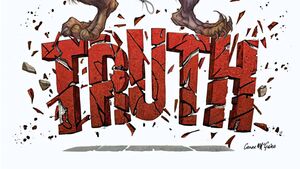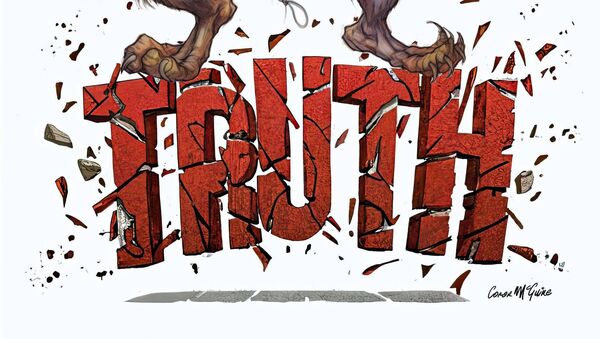We’re living through an epidemic of fakery

The sad punchline is the proliferation of phony news, which has cast a deep, impenetrable fog over legitimate reporting.

We inhabit a world of replicas where authenticity fades in the face of imitation. From emotions to truths, we've traded them for inferior substitutes. Our distinct Irishness, both personally and nationally, is being eroded by a pervasive uniformity. The allure of exposure masquerades as intimacy, while quantity is mistaken for quality, and popularity eclipses true worth. Progress has led us down a treacherous path where artifice has triumphed over true art.
We see it everywhere - fake opinions are parroted back at us by counterfeit followers on social media. Conspiracy cranks whip up outrage and hostility amongst their fanbases to feed some deep pathology. And all soaked up by an unsuspecting public seemingly bereft of its critical faculties.
Fakery has created a culture as synthetic as candyfloss. We gorge on fake news, fake faces filtered to plasticine perfection, and phony outrage drummed up by trolls. Authenticity dissipates as people curate their lives through social media, sacrificing genuine self-expression for pre-packaged uniformity.
As consumers, we devour deceitful promises from companies marketing elusive wellness. Politicians peddle manifestos brimming with short-term pleasantries that congeal into emptiness post-election.
Our society has become Faketopia, cozying up to artifice so much that human and institutional fabrications slip by unnoticed. Groucho Marx's quip, "The secret of life is honesty and fair dealing. If you can fake that, you've got it made," feels all too real.
Of course, artificial embellishment is nothing new. From the dawn of time, we hairless apes have augmented ourselves with all manner of ornamentation and artifice to compensate for our abundant physical shortcomings. We are evolution's fakes, lacking sufficient strength, speed, or natural defences, and have had to rely on our big brains and talent for artful deception to survive and thrive. But perceiving a clear evolutionary motive doesn't make the bias less real.
And so, down the ages, we have donned cosmetics, wigs, corsets, shoulder pads, heels and other anatomical lies that say more flattering things about us than bare nature might reveal. They tell pleasanter little white lies about our age, health, wealth or identity. That helps us look and feel smarter, stronger or more attractive. Which is all well and good, an honest display of harmless vanity and creative self-fashioning.
Things become toxic when the little white lies become bigger, brighter, and brazen. Faking becomes a way of life rather than just a special occasion affectation. And in consumer capitalism and politics, where surface appearances are everything, that line is trampled gleefully underfoot.
In our era of mass communication, something flavourless but toxic has infiltrated society: artificial identities. An epidemic of fraudulence has erupted as people pretend to be anything but their boring selves. They are replacing old notions of discretion, taste and restraint with a loud look-at-me obviousness. If it shone with fake gold and strode around with chunky phony confidence, it didn't matter if the reality was plastic or plywood. Surface gloss has become the substance. An endless quest for inflated online validation, no matter how synthetic the means.
In political terms, it is never to admit to a misjudgment, even at the expense of a glaring truth. But for the more critically-minded, it feels like everything worthwhile has been replaced by a cheap, shiny, inauthentic replica piece. Who wouldn't prefer a politician who seems strong and straight-talking over one honestly overwhelmed with policy complexities? Why read the whole well-researched article when a shocking headline and partisan position will do?
In such a post-truth landscape, it's no wonder industries thrive on mass deception.
Fake personalities saturate social media, too. Online influencers flog curated personas that are more airbrushed than their photos. Twitter users indulge in trollish behaviour and Instagram posts come coated in enough filters to laminate a dance floor. The catfish become catfished.
So the charlatans flourish, the artful dodgers proliferate, and ordinary folk feel ever more disconnected from the essential processes shaping their lives. Big lies have always travelled fast but today move at lightning pace, sowing turmoil societally whilst the unscrupulous profit from a broken system.
But it is a precarious existence, high up in the public eye, head above the safety of anonymous parapets. It takes just one tweet, one poisonous accusation, and one deepfaked image to unleash tsunamis of misinformation and outrage. Social media devotees play judge and jury through fragmented assumptions, while lynch mobs get mobilised to action faster than you can say, "Call my PR consultant".
The rise and fall of public figures is grist for the media mill; propaganda messages get relentlessly repeated through millions of fake accounts until the lies become truisms. Oft repeated half-truths become unassailable truths through endless repetition.
We are caught in an endless wheel of post-truth paralysis, where no one knows what to believe anymore. Woke types crow victory as credibility dies while the rest slink behind device screens, bewildered about what's real and resigned to powerlessness. And when authentic voices try to stem the tide, they are decried by those riding the crested wave of the trending bilge.
The sad punchline is the proliferation of phony news, which has cast a deep, impenetrable fog over legitimate reporting. Just slap the word "fake" on any real story to redirect rubberneckers elsewhere. The real fake news isn't just biased commentary but corrupted sources lying bald-faced with the assurance of being ignored.
The juice that feeds fakery is our credulity, our greed for easy answers, our craving for distraction and our love of gossip over verifiable truths. Can we become wiser media consumers, more savvy to subterfuge and resolute for transparency? We can demand better integrity from those who shape perception - politicians, brands, publishers and platforms. Until then, deviousness will continue being rewarded over honesty, and the slick-crafted delivery will keep coming while civilisation creaks under the corrosion of merry fraudulence.
None of us can single-handedly eliminate the fakery flooding society. But we can model genuineness through our individual choices. We vote with our views, shares, hearts, money, and ballots. And collectively, our demand for authenticity over artifice may slowly strengthen.
And why do I visit this subject, jaundiced and exasperated? In the wake of the child stabbings in Dublin, the PR machine of the Government clanked inevitably into overdrive. I do not doubt that Helen McEntee and Taoiseach Leo Varadkar were sincere in their grief and compassion for the victims and their families. But to feign surprise over the subsequent riots was a step too far.
We all saw this coming. The issue is not immigration but unvetted immigration. All reasonable Irish people welcome people of all races and colours seeking a better life while willing to integrate and contribute to our fast-changing society. But we have a right to demand our borders are adequately policed and applicants vetted.
So what next, as we await the next random incident? How often can a beleaguered Minister or Taoiseach fake surprise when we all wait with bated breath for the inevitable repeat?
Political spin is becoming whiningly repetitive and hollow to all our fearful ears, native and refugee alike.
"No one is safe until we are all safe", to borrow a hackneyed meme. Except this time, it's lamentably true.




